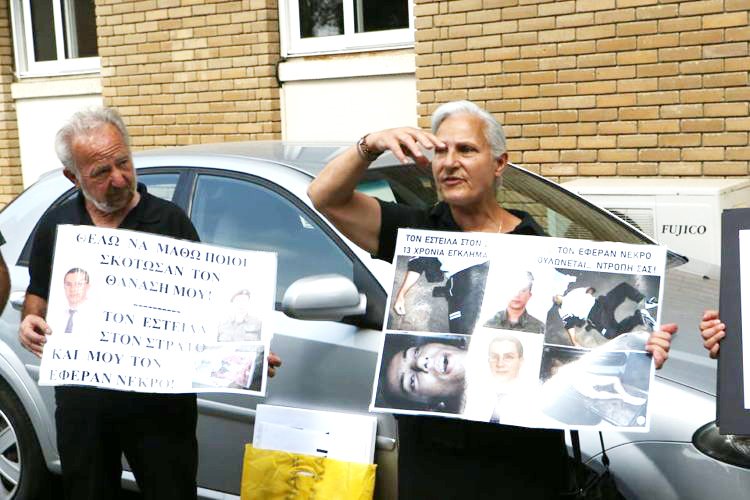A tenacious family’s dogged pursuit of the truth could provide answers to a soldier’s 2005 death
By Achilleas Demetriades
The Nicolaou case is a very sad one indeed. Not only was a young man serving his country found dead, but his mother has been trying, for the last 16 years, to show that it was not a suicide, but murder.
Her efforts had been vindicated after exhumation when the deceased’s skeleton was forensically examined not only in Cyprus but in Athens as well by independent experts.
As a result, the inquest which has been adjourned to October 3, 2021 will most likely be appointing independent criminal experts to reinvestigate the matter.
In this short note I will not dwell on the personal details but rather look at the legal aspect of the case from a European Human Rights point of view.
The family, after the failure of the authorities, who had attempted to shed light on the events and establish the circumstances of Nicolaou’s death on 29 September 2005, turned to the European Court of Human Rights (“ECtHR”) in 2010.
After a long procedure, the ECtHR vindicated them on 28 January 2020 by finding the Cyprus Government liable for a procedural breach of Article 2 (right to life) of the Convention.
It pointed out that the various omissions by the authorities had undermined the plausibility of the findings of the initial investigation. These had also fueled the family’s suspicious of a cover up. In fact: “A more careful and thorough collection of evidence could have shed light on the circumstances surrounding some crucial aspects of the case, clarified certain matters, given less ground for misgivings and avoided the need for further investigations” para 149.
As a result, the Court found that Cypriot authorities had failed to carry out an effective investigation into the circumstances surrounding Mr Nicolaou’s death, leading to a violation of the procedural aspect of Article 2 of the Convention. The Court also awarded €32,000 as non-pecuniary damages.
In accordance with Article 46 of the Convention the Committee of Ministers supervises the execution of the Judgments of the Court
The Committee’s essential function (DH) is to ensure that member states comply with the judgments. This is done at four regular meetings every year.
It should also be noted that judgments are essentially executed at three levels. The first relates to just satisfaction, the second to individual measures and the third to general measures.
The just satisfaction relates to the payment of the award made by the Court. The individual measures relate to the steps that the Respondent has to take in order to remedy the specific situation of the Applicant and last but not least, the general measures serve to ensure that no one else falls victim of the violation established.
Procedurally a state will submit to DH an Action Plan to give effect to the above.
In fact, the Cyprus government had submitted such a plan on 8 March 2021 to be considered at the June session of DH.
It stated that the just satisfaction had been paid and that on 26 February 2020, (less than a month after judgment by the ECtHR) the District Court of Limassol had ordered the re-opening of Athanasios Nicolaou’s inquest.
This was followed by an exhumation and forensic examination of the deceased’s skeleton in Cyprus and later on in Athens by independent experts.
At the time of the submission of the Action Plan the reports had not been completed and the government undertook to update DH accordingly.
On the general measures level there were additional police circulars for: (a) procedures to be followed in relation to investigations and handling of sudden or unnatural death cases and (b) handling of evidence during the investigation of such cases. Furthermore, additional training at the police academy was given in relation to death inquests. Last but not least, the judgment itself was disseminated to various domestic authorities.
On paper the above look good but will be put to the test at the next DH meeting in September 2021 when the Government will have to provide an update on the progress of the inquest and the additional expert evidence that has transpired.
Most likely the appointment of independent criminal investigators will be made to the satisfaction of the family.
Perhaps the most important aspect of this case, from the Human Rights perspective, is the vindication of the family after 16 years. One can only respect the courage and nerve of Mrs Nicolaou who is living to proof that ‘Mother Knows Best’.
Furthermore, it shows how the supervision by the DH forces states to bring about the execution of judgments not just on the theoretical level of paying the award, but more importantly on the level of effective individual measures.
Had it not been for the judgment, the inquest would not have reopened. It is the push from Strasbourg that ensures that states take judgments (which bind them) seriously.
One can only wait to see how this new investigation will turn out and how it will address the points not dealt with initially.
The family in this case and for that matter any applicant should feel assured that the supervisory role of DH is there as a watchdog in the execution of judgments not just on the individual level, but also on the level of general measures which benefits all.
Achilleas Demetriades, is a partner at the Lellos P Demetriades law office LLC







Click here to change your cookie preferences